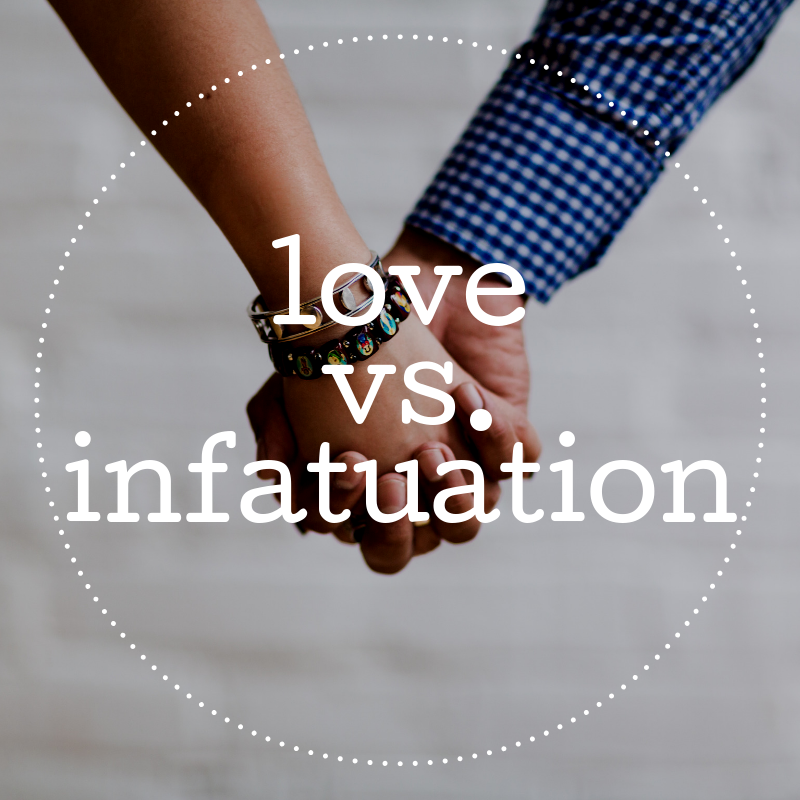Infatuation is a feeling that most people have experienced at some point in their lives. It is often described as an intense and overwhelming attraction to someone, in which you beieve that you have found the “perfect” person and the “perfect” relationship. However, infatuation is not the same as love, and it usually lasts between 18 months and three years.
During the infatuation phase, people tend to see their partners through rose-colored glasses. They overlook their flaws, ignore red flags, and focus on the positive aspects of the relationship. This is because infatuation is driven by hormones such as dopamine, serotonin, and oxytocin, which create a sense of euphoria and pleasure. It is a natural response to the initial attraction and can be an exciting and enjoyable experience.
However, as time goes on, the infatuation phase fades away, and reality sets in. People begin to see their partners more clearly, including their flaws and imperfections. This can be a challenging phase for some individuals, as they may feel disappointed or let down by their partner’s actions or behavior. It is important to recognize that this is a normal part of the process and that no one is perfect.
Infatuation can last longer if the relationship is long-distance or if one partner has deep-seated insecurities. In these cases, the infatuation phase may be prolonged, and people may continue to idealize their partners even when the relationship is not healthy or sustainable.
It is essential to distinguish between infatuation and love. While infatuation is driven by hormones and intense attraction, love is a more profound and long-lasting emotion that develops over time. Love involves a deep understanding and acceptance of one’s partner, including their flaws and imperfections.
Infatuation is a natural and exciting phase in a relationship that usually lasts between 18 months and three years. It is characterized by intense attraction, idealization of one’s partner, and a sense of pleasure and euphoria. However, as the infatuation phase fades, people begin to see their partners more clearly, including their flaws and imperfections. It is important to recognize that this is a normal part of the process and that no one is perfect. Infatuation can turn into love, but it is essential to distinguish between the two and to develop a deeper understanding and acceptance of one’s partner over time.
How Long Does It Take for Infatuation to Wear Off?
Infatuation is a strong feeling of attraction towards someone that can make you feel on top of the world. However, this feeling does not last forever, and it eventually fades away. The duration of infatuation varies from person to person, but it usually lasts between 18 months and three years.
During the infatuation period, the person tends to idealize the other person, and they believe that the other person is perfect. They may overlook the flaws of the other person and focus only on ther positive qualities. This feeling is intense, and it can be overwhelming at times.
However, as time passes, the intensity of infatuation wears off. The person begins to see the other person more realistically, and they may start to notice their flaws. This realization can cause disappointment, and the intensity of infatuation starts to wane gradually.
It’s worth noting that infatuation can be prolonged in some cases, such as in a long-distance relationship or when a person is deeply insecure. In such cases, the infatuation may last longer than the usual duration.
Infatuation is a temporary feeling, and it usually lasts between 18 months to three years. After that, the intensity of infatuation starts to wear off, and the person begins to see the other person more realistically. It’s essential to recognize the difference between infatuation and love, as infatuation is a fleeting feeling, whereas love is a long-lasting emotion that requires effort and commitment.

Identifying Infatuation vs. True Love
Infatuation is a strong feeling of attraction towards someone, but it is not always love. It is important to recognize the difference betwen infatuation and love to avoid getting hurt or hurting someone else. Here are five symptoms that can help you understand if what you are feeling is just infatuation:
1. You See and Expect Perfection: Infatuation leads you to believe you have found the “perfect” person as well as the “perfect” relationship. You may ignore their flaws and only focus on their positive qualities.
2. You Have Persistent and Intrusive Thoughts: Infatuation can consume your thoughts and make it difficult to focus on anything else. You may find yourself constantly daydreaming about the person or obsessing over their every move.
3. You Drop Everything for Them: Infatuation can make you prioritize the person above everything else in your life, even if it means neglecting your own responsibilities or relationships with others.
4. You Become Jealous and Possessive: Infatuation can make you feel possessive of the person and jealous of anyone who gets their attention. You may become overly protective or controlling in the relationship.
5. You Feel Tired and Alone: Infatuation can be emotionally draining, leaving you feeling exhausted and lonely. You may feel like you are the only one putting effort into the relationship and that the other person is not reciprocating your feelings.
If you are experiencing any or all of these symptoms, it is likely that what you are feeling is just infatuation. It is important to take a step back and evaluate your feelings before making any long-term commitments. Communication is key in any relationship, so talk to the person and make sure you are on the same page. Remember, infatuation can be fleeting, but true love takes time and effort to build.
Can Infatuation Develop Into Love?
Infatuation and love are two distinct emotions that are often confused with each other. While infatuation is characterized by intense feelings of attraction, admiration, and passion towards someone, love is a deeper and more complex emotion that involves a strong sense of attachment, commitment, and intimacy.
Infatuation is often based on physical attraction, fantasies, and idealized perceptions of the other person, rather than on a real understanding of who they are. Infatuation can be intense and all-consuming, but it is usually short-lived and fades away once the initial excitement wears off.
On the other hand, love is built on a foundation of trust, respect, and shared experiences. Love is a gradual process that takes time and effort to develop. It involves getting to know the other person on a deeper level, accepting their flaws and imperfections, and building a strong emotional connection.
While infatuation can sometimes turn into love, it is not always the case. In many cases, infatuation remains just that – a fleeting crush or attraction that nevr develops into anything more meaningful.
Factors such as compatibility, shared values, and mutual respect play a crucial role in determining whether infatuation can turn into love. However, it is important to note that even if all the right conditions are present, there is no guarantee that infatuation will transform into love.
Infatuation and love are two distinct emotions that can sometimes overlap. Infatuation can turn into love under the right circumstances, but it is not always the case. Building a lasting and meaningful relationship requires more than just intense feelings of attraction – it requires a deep emotional connection, mutual respect, and a willingness to work through the challenges that inevitably arise in any relationship.
The End of Infatuation: What Comes Next?
After the infatuation period is over, couples start to see each other’s faults and negative traits. This phase is known as the disillusionment period. During this stage, the intense feelings of love and passion start to fade away, and couples begin to see each other’s flaws and weaknesses. This can be a challenging and stressful time for many couples, as they may feel disappointed or disillusioned with their partner.
One of the significant changes that occur after infatuation is over is a shift in priorities. The initial focus on romance and passion is replaced by a more practical approach to the relationship. Couples start to pay attention to oher aspects of their relationship, such as communication, trust, and mutual respect. They may also start to realize that they need to work on their individual issues and personal growth to maintain a healthy relationship.
Another significant change that occurs after infatuation is over is that couples start to have more realistic expectations of each other. They begin to see each other as real human beings with their own flaws and weaknesses. This can be a positive thing, as it allows couples to accept each other for who they are, rather than trying to change each other.
During this phase, it is essential to communicate openly and honestly with your partner. Discuss your feelings and concerns, and work together to find solutions to any issues that arise. It is also crucial to take responsibility for your own behavior and accept your partner’s faults and weaknesses.
After the infatuation period is over, couples go through a phase of disillusionment, where they start to see each other’s flaws and negative traits. This can be a challenging time, but it is essential to communicate openly, accept each other’s faults, and work together to maintain a healthy and happy relationship.

Conclusion
Infatuation is a natural and normal part of the human experience. It can be an exhilarating feeling that makes us feel alive and full of passion. However, it is important to remember that infatuation is not the same as love. Infatuation is often based on idealized fantasies and can lead to unrealistic expectations in a relationship. It is important to be aware of the symptoms of infatuation, such as expecting perfection and becoming possessive, in order to avoid potential harm to ourseves and our relationships. As the infatuation period ends, it is important to take responsibility for our actions and accept our faults in order to ensure a healthy and lasting relationship. By understanding the difference between infatuation and love, we can approach relationships with a clearer and more realistic perspective.
